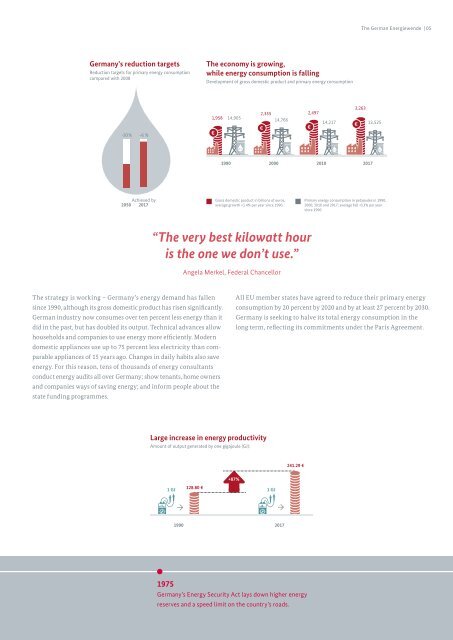The German Energiewende
Create successful ePaper yourself
Turn your PDF publications into a flip-book with our unique Google optimized e-Paper software.
<strong>The</strong> <strong>German</strong> <strong>Energiewende</strong> | 05<br />
<strong>German</strong>y’s reduction targets<br />
Reduction targets for primary energy consumption<br />
compared with 2008<br />
<strong>The</strong> economy is growing,<br />
while energy consumption is falling<br />
Development of gross domestic product and primary energy consumption<br />
1,958 14,905<br />
2,355<br />
14,766<br />
2,497<br />
14,217<br />
3,263<br />
13,525<br />
-50 % -6 %<br />
1990<br />
2000<br />
2010<br />
2017<br />
Achieved by<br />
2050 2017<br />
Gross domestic product in billions of euros,<br />
average growth +1.4% per year since 1990.<br />
Primary energy consumption in petajoules in 1990,<br />
2000, 2010 and 2017; average fall -0.3% per year<br />
since 1990<br />
“<strong>The</strong> very best kilowatt hour<br />
is the one we don’t use.”<br />
Angela Merkel, Federal Chancellor<br />
<strong>The</strong> strategy is working – <strong>German</strong>y’s energy demand has fallen<br />
since 1990, although its gross domestic product has risen significantly.<br />
<strong>German</strong> industry now consumes over ten percent less energy than it<br />
did in the past, but has doubled its output. Technical advances allow<br />
households and companies to use energy more efficiently. Modern<br />
domestic appliances use up to 75 percent less electricity than comparable<br />
appliances of 15 years ago. Changes in daily habits also save<br />
energy. For this reason, tens of thousands of energy consultants<br />
conduct energy audits all over <strong>German</strong>y; show tenants, home owners<br />
and companies ways of saving energy; and inform people about the<br />
state funding programmes.<br />
All EU member states have agreed to reduce their primary energy<br />
consumption by 20 percent by 2020 and by at least 27 percent by 2030.<br />
<strong>German</strong>y is seeking to halve its total energy consumption in the<br />
long term, reflecting its commitments under the Paris Agreement.<br />
Large increase in energy productivity<br />
Large Amount of increase output generated in energy by one gigajoule productivity<br />
(GJ):<br />
Amount of output generated by one gigajoule (GJ):<br />
+87%<br />
1 GJ<br />
128.80 €<br />
+87%<br />
1 GJ<br />
1 GJ<br />
128.80 €<br />
1 GJ<br />
241.29 €<br />
241.29 €<br />
1990 2017<br />
1990 2017<br />
1975<br />
<strong>German</strong>y’s Energy Security Act lays down higher energy<br />
reserves and a speed limit on the country’s roads.

















